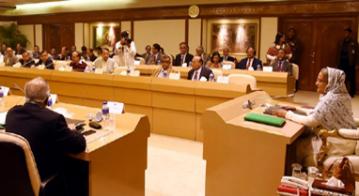DHAKA, Jan 29, 2018 (BSS) – The Cabinet today approved the draft of a revised cyber security law incorporating provisions which, officials said, were found to be left out in the existing law to prevent cyber crimes.
The weekly cabinet meeting with Prime Minister Sheikh Hasina in the chair approved the draft of the Digital Security act-2018 with officials saying it would protect the country’s critical information infrastructure (CII) simultaneously containing the cyber crimes.
“The ‘Digital Security act-2018’ has been formulated to combat the growing cyber crimes also affecting many public and private organizations including the central bank,” Cabinet Secretary Md. Shafiul Alam told a media briefing reporters at Bangladesh Secretariat after the meeting.
He said the proposed law was formulated as the existing one on ICT slipped away many aspects of cyber crimes.
Alam said crimes committed by using electrical, digital, magnetic, optical, biometric, electrochemical, electromechanical, wireless and electromechanical technology would come under the purview of the proposed law.
The top bureaucrat of the country said the cabinet today also gave final approval to the draft of the ‘Constitution (seventeenth amendment) Act, 2018’.
“The proposed constitutional amendment suggested extension of the constitutional provision of 50 reserve seats for women in parliament for subsequent 25 years from 11th Parliament,” Alam said.
He said the cabinet simultaneously gave nod to the draft of a MoU for trilateral cooperation among ROSATOM of Russia, Ministry of Science and Technology of Bangladesh and Department of Atomic Energy of India to implement the Rooppur Nuclear Power Plant Project in Bangladesh.
The cabinet secretary said the meeting also approved in principle to the draft of the “National Skill Development Authority Act, 2018′ which proposed formation of the National Skill Development Authority” under the PMO.
The revised cyber security law proposed abolition of the article 54, 55, 56, 57 and 66 of the ICT Act, 2006 and different punitive actions considering the nature of the crimes committed.
The cabinet secretary said the draft specified the process to investigate into an allegation identifying 14 types of offenses to be treated as cognizable and non-bail-able crimes under sections 17, 19, 21, 22, 23, 24, 26, 27, 280, 30, 31, 32, 33, 34.
He said offenses to fall under sections 20, 25. 29 and 48 would be regarded as non- cognizable ones.
The draft, he said, suggested that one could face imprisonment of up to 14 years for collecting or publishing or preserving any secret information illegally entering into an office of the government, semi-government or statutory body alongside a fine of Taka 25 lakh.
The cabinet secretary said the law proposed for establishing a Digital Security Council headed by the Prime Minister to review the state of the cyber security system.
The law also proposed establishment of a Digital Forensic Lab and Digital Security Agency headed by a Director General (DG) under which an emergency response team would work round the clock.
The DG would have power of taking preventive measures against cyber crime and authority to request the Bangladesh Telecommunication Regulatory Authority to remove or block any content harmful to the social peace, safety and communal harmony.
The cabinet secretary said the offenses under the ‘Digital Security Act- 2018’ has been defined in the articles 17 to 38 of the law where different terms imprisonment and fine were proposed for such crimes.
The draft proposed 14 years imprisonment or fine of Taka one crore or both for any propaganda, speech or campaign in digital medium against the War of Liberation and Father of the Nation Bangabandhu Sheikh Mujibur Rahman or committing any crime against the integrity, sovereignty and independence of the country.
A person to be found guilty for any posting or publishing any content in the internet hurting the religious sentiment of another person would face ten years imprisonment or fine of Taka 10 lakh or both.
For publishing any contemptuous content in the website or digital device as defined in the Penal Code, a person may face three years imprisonment or fine of Taka five lakh or both, the law said.



